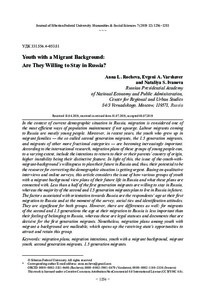Youth with a Migrant Background: Are They Willing to Stay in Russia?
Скачать файл:
URI (для ссылок/цитирований):
https://elib.sfu-kras.ru/handle/2311/111799Автор:
Rocheva, Anna L.
Varshaver, Evgeni A.
Ivanova, Nataliya S.
Рочева, А. Л.
Варшавер, Е. А.
Иванова, Н. С.
Дата:
2019-07Журнал:
Журнал Сибирского федерального университета. Гуманитарные науки. Journal of Siberian Federal University. Humanities & Social Sciences;2019 12 (7)Аннотация:
In the context of current demographic situation in Russia, migration is considered one of the most efficient ways of population maintenance if not upsurge. Labour migrants coming to Russia are mostly young people. Moreover, in recent years, the youth who grew up in migrant families — the so called second generation migrants, the 1.5 generation migrants, and migrants of other more fractional categories — are becoming increasingly important. According to the international research, migration plans of these groups of young people can, to a varying extent, include the intentions to return to their or their parents’ country of origin, higher instability being their distinctive feature. In light of this, the issue of the-youth-with-migrant-background’s willingness to plan their future in Russia and, thus, their potential to be the resource for correcting the demographic situation is getting urgent. Basing on qualitative interviews and online surveys, this article considers the issue of how various groups of youth with a migrant background view plans of their future life in Russia and what these plans are connected with. Less than a half of the first generation migrants are willing to stay in Russia, whereas the majority of the second and 1.5 generation migrants plan to live in Russia in future. The factors associated with orientation towards Russia are the respondents’ age at their first migration to Russia and at the moment of the survey, social ties and identification attitudes. They are significant for both groups. However, there are differences as well: for migrants of the second and 1.5 generations the age at their migration to Russia is less important than their feeling of belonging to Russia, whereas these are legal statuses and documents that are decisive for the first generation migrants. Nonetheless, migration plans among youth with migrant a background are malleable, which opens up the receiving state’s opportunities to attract and retain this group В контексте современной демографической ситуации в России миграция рассматривается как один из наиболее действенных способов если не роста, то поддержания
численности населения на том же уровне. В трудовой миграции в Россию участвуют
преимущественно молодые люди, а кроме того, в последние годы все большую значимость приобретает группа молодежи, выросшей в России в семьях мигрантов —
так называемые мигранты второго поколения, полуторного поколения и прочих более
дробных категорий. Согласно международным исследованиям, миграционные планы таких групп молодежи могут в разной степени включать намерение вернуться
в страну происхождения, свою или родителей, а также в целом отличаться большей
лабильностью. В свете этого особую важность приобретает вопрос о том, насколько молодежь с миграционным бэкграундом видит свое будущее в России и в силу этого
действительно может стать ресурсом по корректировке демографической ситуации.
В этой статье на основе качественных интервью, а также данных онлайн-опросов
мы рассматриваем, как разные группы молодежи с миграционным бэкграундом оценивают свои перспективы в будущем жить в России и с чем связаны те или иные
планы. Мигранты первого поколения меньше чем в половине случаев намереваются
оставаться в России, тогда как мигранты второго и полуторного поколений, напротив, в большинстве своем связывают будущее с Россией. Значимые для обеих групп
факторы, связанные с ориентацией на Россию, включают в себя возраст респондента
при переезде/первом приезде в Россию и на момент опроса, круги общения, а также
идентификационные установки. Однако есть и различия: для мигрантов второго и полуторного поколений возраст приезда оказывается менее значимым, чем ощущение
принадлежности в России, а для мигрантов первого поколения важны правовые статусы и документы. Тем не менее, планы на будущее среди молодежи с миграционным
бэкграундом пластичны, что открывает для принимающего государства возможности по привлечению и удержанию этой группы
Коллекции:
Метаданные:
Показать полную информациюСвязанные материалы
Показаны похожие ресурсы по названию, автору или тематике.
-
Socialization of Tajik Students in Tomsk University Space: Looking for Models and Meaning
Pogodaev, Nikolay P.; Погодаев, Н.П. (Сибирский федеральный университет. Siberian Federal University, 2016-04)In the last ten years, the number of students from Tajikistan studying at Tomsk universities has been steadily increasing. Statistics of the Ministry of Education and Science of the Russian Federation shows that this ... -
Каких мигрантов привлекают экономически развитые страны и как они это делают: анализ международного опыта
Иванова, Н. С.; Варшавер, Е. А.; Рочева, А. Л.; Ivanova, Nataliya S.; Varshaver, Evgeni A.; Rocheva, Anna L. (Сибирский федеральный университет. Siberian Federal University, 2021)Современный этап миграционной истории человечества предполагает, что мигранты рассматриваются как ресурс демографического и экономического развития, а развитые страны борются за мигрантский человеческий капитал, разрабатывая ... -
Влияние мест резидентной концентрации мигрантов на интеграцию мигрантов второго поколения в России
Иванова, Н. С.; Ivanova, Nataliya S. (Сибирский федеральный университет. Siberian Federal University, 2022-12)Успех интеграции мигрантов второго поколения во многом зависит от контекста, в котором она происходит. К контексту традиционно относят культурную, языковую, образовательную, правовую и пространственную среду. В России за ... -
From the “Influx of the Yellow Race” to “Migrant Workers”: Dynamics of the Languages for Describing Cross-Border Migrations in Russia
Dyatlov, Victor I.; Dyatlova, Elena V.; Дятлов, В.И.; Дятлова, Е.В. (Сибирский федеральный университет. Siberian Federal University, 2020-05)The phenomenon of mass cross-border labour migrations to Russia of the late imperial and post-Soviet periods was in an urgent need of comprehension in order to build relationships (for the population) and to “manage the ... -
Ethnic Markets in post-Soviet Transitional Space: Their Role in Society and the Research Area
Diatlov, Victor I.; Дятлов, В.И. (Сибирский федеральный университет. Siberian Federal University, 2016-04)Open-air markets have become an essential element of the post-socialist transitional space. They appear over a vast area from China to Poland and Germany. Coupled with the huge scale and meaningful “shuttle trading”, ...

